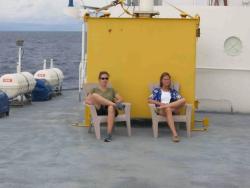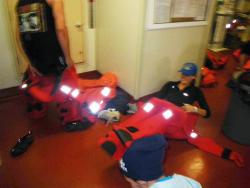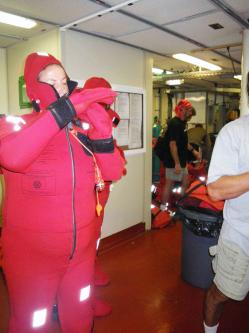Please note: You are viewing
the unstyled version of this website. Either your browser does not support CSS
(cascading style sheets) or it has been disabled. Skip
navigation.
Liz DouglassAfter our January 5 departure, the R/V Melville had a ways to go before the first sampling station on our transect line, latitude of 32.5 S. The time was much appreciated by all aboard. We had time to get our sea legs, get used to the constant rolling of the ship and get over any seasickness. We also had time to learn a few new skills that would come in handy, from the specifics of how to take water samples to the skills necessary to deploy and retrieve the CTD rosette. We practiced "hooking" the CTD (needed for retrieval), coiling and throwing ropes, and tying the necessary knots. I never knew there were this many different ways to tie a bowline! Some members of our science team are now able to tie a bowline with one hand with their eyes closed and behind their backs, which I suppose could come in handy someday. All of this practice increased the confidence that when it came time to start handling the rosette, we would be ready. Other than that, the first three or four days allowed us all to simply adapt to life at sea. We learned the schedule of the ship and got to know each other a little better. Instruments were set up and everything well-secured, a necessity for life at sea. During this time there were significant swells and wind-driven waves (8-12 feet), causing the boat to pitch and roll a fair amount, at least enough to reinforce how important it is to have everything tied down. Another new eye-opening event was the first General Alarm, that is the fire and boat drill, a weekly routine on ships. Every week, the fire and boat drills teach you something you hope you'll never have to use. For example, we all learned where our lifeboats were located. Also, as part of that drill, we all got to try on immersion suits, also known as "gumby suits" -- if you look at the photos, you'll understand why (even though the suits aren't green). Finally, during the transit, we waiting and relaxed. While we were anxious to get started, we also knew that when the science started, there wouldn't be much more down time, and we should enjoy the time we had before everything got going. Last updated: January 15, 2010 | |||||||||||||||||||
Copyright ©2007 Woods Hole Oceanographic Institution, All Rights Reserved, Privacy Policy. | |||||||||||||||||||



